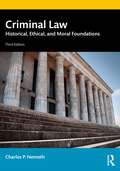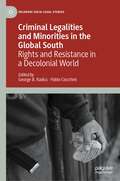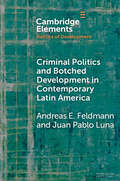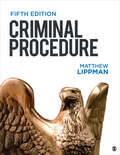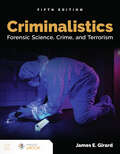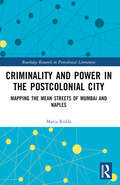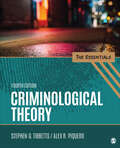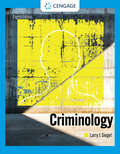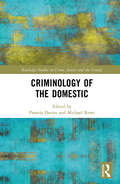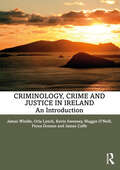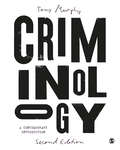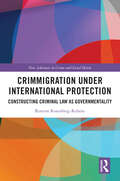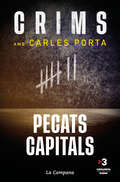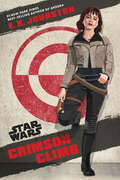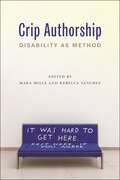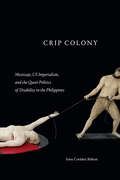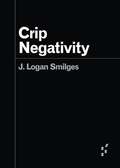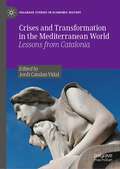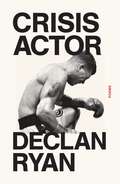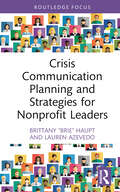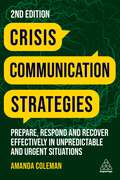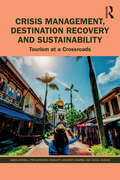- Table View
- List View
Criminal Law: Historical, Ethical, and Moral Foundations
by Charles P. NemethCriminal Law: Historical, Ethical, and Moral Foundations, 3rd edition, blends legal and moral reasoning in the examination of crimes and explores the history relating to jurisprudence and roots of criminal law. In order to fully grasp criminal law concepts, students must go beyond mere rote memorization of the penal code and endeavor to understand where the laws originate from and how they have developed. This book fosters discussions of controversial issues and delivers abridged case law decisions that target the essence of appellate rulings. Grounded in the Model Penal Code, making the text national in scope, this volume examines: Why the criminal codes originated, and the moral, religious, spiritual, and human influences that led to our present system How crimes are described in the modern criminal justice model The two essential elements necessary for criminal culpability: actus reus (the act committed or omitted) and mens rea (the mind and intent of the actor) Offenses against the body resulting in death, including murder, manslaughter, felony murder, and negligent homicide Non-terminal criminal conduct against the body, including robbery, kidnapping, false imprisonment, assault, and hate crimes Sexual assault, rape, necrophilia, incest, and child molestation Property offenses, such as larceny/theft, bribery, forgery, and embezzlement Crimes against the home, including burglary, trespassing, arson, and vandalism The book also examines controversial public morality issues such as prostitution, drug legalization, obscenity, and pornography. The final two chapters discuss inchoate offenses, where the criminal act has not been completed, and various criminal defenses, such as legal insanity, entrapment, coercion, self-defense, and mistake of fact or law. Important keywords introduce each chapter, and discussion questions and suggested readings appear at the end of each chapter, prompting lively debate and further inquiry into a fascinating subject area that continues to evolve. Updated to include the latest developments in the law, this book is appropriate for undergraduate students in criminal law and related courses.
Criminal Legalities and Minorities in the Global South: Rights and Resistance in a Decolonial World (Palgrave Socio-Legal Studies)
by Pablo Ciocchini George B. RadicsThis book explores how the law and the institutions of the criminal justice system expose minorities to different types of violence, either directly, through discrimination and harassment, or indirectly, by creating the conditions that make them vulnerable to violence from other groups of society. It draws on empirical insights across a broad array of communities and locales including Afghanistan, Colombia, Pakistan, India, Malawi, Turkey, Brazil, Singapore, Puerto Rico, and the Philippines. It examines the challenges of protecting those at the margins of power, especially those whom the law is often used to oppress. The chapters explore intersecting, marginal identities influenced by four factors: rebuilding after violent regimes, economic interest behind the violence, entrenched cultural biases, and criminalisation of diversity. It provides scholars from the Global North with important lessons when attempting to impose their own solutions onto nations with a different history and context, or when applying their own laws to migrants from the Global South nations explored in this book. It speaks to legal and social science scholars in the fields of law, sociology, criminology, and social work.
Criminal Politics and Botched Development in Contemporary Latin America (Elements in the Politics of Development)
by Andreas E. Feldmann Juan Pablo LunaThis Element investigates the relationship between the narcotics industry and politics and assesses how it influences domestic political dynamics, including economic development prospects in Latin America. It argues that links between criminal organizations, politicians, and state agents give rise to criminal politics (i.e., the interrelated activity of politicians, organized crime actors, and state agents in pursuing their respective agendas and goals). Criminal politics is upending how countries function politically and, consequently, impacting the prospects and nature of their social and economic development. The Element claims that diverse manifestations of criminal politics arise depending on how different phases of drug-trafficking activity (e.g., production, trafficking, and money laundering) interact with countries' distinct politico-institutional endowments. The argument is probed through the systematic examination of four cases that have received scant attention in the specialized literature: Chile,Paraguay, Peru, and Uruguay.
Criminal Procedure
by Matthew LippmanThis contemporary, comprehensive, case-driven textbook from award-winning teacher Matthew Lippman covers the constitutional foundation of criminal procedure and includes numerous cases selected for their appeal to today’s students. Organized around the challenge of striking a balance between rights and liberties, Criminal Procedure emphasizes diversity and its impact on how laws are enforced. Built-in learning aids, including You Decide scenarios, Legal Equations, and Criminal Procedure in the News features, engage students and help them master key concepts. Fully updated throughout, the Fifth Edition includes today’s most recent legal developments and decisions. This title is accompanied by a complete teaching and learning package in SAGE Vantage, an intuitive learning platform that integrates quality SAGE textbook content with assignable multimedia activities and auto-graded assessments to drive student engagement and ensure accountability. Unparalleled in its ease of use and built for dynamic teaching and learning, Vantage offers customizable LMS integration and best-in-class support.
Criminal Procedure
by Matthew LippmanThis contemporary, comprehensive, case-driven textbook from award-winning teacher Matthew Lippman covers the constitutional foundation of criminal procedure and includes numerous cases selected for their appeal to today’s students. Organized around the challenge of striking a balance between rights and liberties, Criminal Procedure emphasizes diversity and its impact on how laws are enforced. Built-in learning aids, including You Decide scenarios, Legal Equations, and Criminal Procedure in the News features, engage students and help them master key concepts. Fully updated throughout, the Fifth Edition includes today’s most recent legal developments and decisions. This title is accompanied by a complete teaching and learning package in SAGE Vantage, an intuitive learning platform that integrates quality SAGE textbook content with assignable multimedia activities and auto-graded assessments to drive student engagement and ensure accountability. Unparalleled in its ease of use and built for dynamic teaching and learning, Vantage offers customizable LMS integration and best-in-class support.
Criminalistics: Forensic Science, Crime, and Terrorism
by James E. GirardCriminalistics continues to set the standard for modern forensic methods and investigative techniques in a new, updated fifth edition. Beginning at the crime scene and proceeding to the forensic laboratory, the text walks the reader through the entire forensic investigation. Students learn how to accurately identify, gather, and analyze multiple types of evidence by examining actual crimes that were solved using the techniques presented. The Fifth Edition features new contemporary case studies and updated statistics. Also, the section about terrorism has been updated and expanded to include important terrorism-related topics: agroterrorism, the forensic analysis of internet data, cyberterrorism, explosives, weapons of mass destruction, and the techniques used to identify them. The most comprehensive and accessible text of its kind, Criminalistics: Forensic Science, Crime, and Terrorism, Fifth Edition is a practical, student-friendly introduction to this exciting science.
Criminality and Power in the Postcolonial City: Mapping the Mean Streets of Mumbai and Naples
by Maria RiddaThis book investigates the literary imaginings of the postcolonial city through the lens of crime in texts set in Naples and Mumbai from the 1990s to the present. Employing the analogy of a ‘black hole,’ it posits the discourse on criminality as a way to investigate the contemporary spatial manifestations of coloniality and global capitalist urbanity. Despite their different histories, Mumbai and Naples have remarkable similarities. Both are port cities, ‘gateways’ to their countries and regional trade networks, and both are marked by extreme wealth and poverty. They are also the sites and symbolic battlegrounds for a wider struggle in which ‘the North exploits the South, and the South fights back.’ As one of the characters of the novel The Neapolitan Book of the Dead puts it, a narrativisation of the underworld allows for a ‘discovery of a different city from its forgotten corners.’ Crime provides a means to understand the relationship between space and society/culture in a number of cities across the Global South, by tracing a narrative of postcolonial urbanity that exposes the connections between exploitation and the ongoing ‘coloniality of power.’
Criminological Theory: The Essentials
by Stephen G. Tibbetts Alex R. PiqueroCriminological Theory: The Essentials, Fourth Edition by Stephen G. Tibbetts and Alex R. Piquero is a brief yet comprehensive overview of the major concepts and perspectives of the key theories in the evolution of criminology. Putting criminological theory in context, the acclaimed authors examine policy implications brought about by theoretical perspectives to show students the practical application of theories to contemporary social problems. The new edition has been thoroughly updated with the latest theoretical extensions and empirical research, with links made to specific theories and recent events.
Criminological Theory: The Essentials
by Stephen G. Tibbetts Alex R. PiqueroCriminological Theory: The Essentials, Fourth Edition by Stephen G. Tibbetts and Alex R. Piquero is a brief yet comprehensive overview of the major concepts and perspectives of the key theories in the evolution of criminology. Putting criminological theory in context, the acclaimed authors examine policy implications brought about by theoretical perspectives to show students the practical application of theories to contemporary social problems. The new edition has been thoroughly updated with the latest theoretical extensions and empirical research, with links made to specific theories and recent events.
Criminology
by Larry J. SiegelWritten by bestselling author Larry Siegel, CRIMINOLOGY, 8th Edition, guides you through the fast-paced field of modern criminology, its most current research and fascinating examples that help you understand criminological theory. Details on the crimes of real-life people illustrate concepts, while unbiased coverage of even the most controversial topics -- ranging from responses to sexual assault on campus to cybercrime -- enables you to form your own opinions about current issues and events. The 8th edition offers insights into racial bias, political crime, terrorism, green-collar crime, ransomware attacks, human trafficking, the impact of the COVID-19 pandemic and more. Features such as "Crime of the Century" provide in-depth discussions of notorious crimes that captivated the public and shaped the way we view the true meaning of justice. Also available: MindTap digital learning solution.
Criminology of the Domestic (Routledge Studies in Crime, Justice and the Family)
by Pamela Davies Michael RoweBringing together a range of perspectives, this book establishes a criminology of the domestic, paying particular attention to emerging spatial and relational reconfigurations. We move beyond criminologies of public and urban domains to consider over-looked non-public locales, and crimes and harms that occur in the home and other private spaces. Developed in the context of the COVID-19 lockdowns, where distinctions between public and private became increasingly untenable, the book considers how the pandemic has accelerated new patterns of behaviour, enabled by technology and shifting social relations.Drawing on a range of criminological topics, including victimisation, offending, property and violent crime, consumption, deviance and leisure, and zemiology, the book argues that the domestic sphere, and its relation to the public realm, needs to be more carefully conceptualised if criminology is to respond to new spatial and relational dimensions of changing lifestyles.An accessible and compelling read, this book will appeal to students and scholars of criminology, sociology, politics, geography, history, gender, surveillance and security, and all those interested in a criminology of the domestic sphere.
Criminology, Crime and Justice in Ireland: An Introduction
by Maggie O'Neill Orla Lynch James Windle Fiona Donson Kevin Sweeney James CuffeThis book offers an accessible and comprehensive introduction to criminology in Ireland. Logically structured and clearly written, this book explores theory and empirical research through real-life examples from an Irish context. Engaging and challenging, this book encourages critical thinking about, and understanding of, crime and crime control in Ireland, North and South. The book covers the canon of criminological theory, from classical and psychological approaches right through to the contemporary. It offers an overview of the Irish criminal justice system, including the police, prisons and alternatives to punishment. It covers key criminological themes such as victims and victimology, gender, the drug trade and its regulation, terrorism and political violence, and desistance and the life course. Key features include: Critical assessment of key criminological theories, which are later woven into discussions of key thematic areas; Case studies of historical and contemporary Irish events, including the Magdalene Laundries, gangland feuds and the decriminalisation of drugs; Extensive reading lists of key academic texts and relevant Irish literature, movies, music and art. This book is the only comprehensive criminology textbook specifically designed for the Irish undergraduate curriculum. It is essential reading for all criminology students in the Republic of Ireland and Northern Ireland and will also be of interest to postgraduates and academics looking for an overview of Irish Criminology.
Criminology: A Contemporary Introduction
by Tony MurphyCriminology is a contemporary, applied, and critical criminology textbook that demonstrates the interdisciplinary nature of criminology, and the links between criminological enquiry and wider social and global issues and processes. Concise, focused and engaging, this second edition masterfully conveys the key issues and perspectives within criminology with ease, and it is accompanied by a range of features to support and test student learning in each chapter. Tony Murphy′s accessible writing style and valuable expertise enables students to connect with core and emergent topics and themes within the field. This fully updated new edition includes: · A brand new chapter on social harm / beyond criminology (inclusive of social murder, structural violence, social protest and its governance) · More social media focus · Topical examples e.g., material on feminicide in relation to counting crime, the creation of new offences in relation to Covid and how this relates to the various definitions of crime, the Afghanistan debacle and more. This is an essential introductory text that provides the foundation needed for studies in criminology. Tony Murphy is a Staff Tutor in Criminology at the Open University.
Criminology: A Contemporary Introduction
by Tony MurphyCriminology is a contemporary, applied, and critical criminology textbook that demonstrates the interdisciplinary nature of criminology, and the links between criminological enquiry and wider social and global issues and processes. Concise, focused and engaging, this second edition masterfully conveys the key issues and perspectives within criminology with ease, and it is accompanied by a range of features to support and test student learning in each chapter. Tony Murphy′s accessible writing style and valuable expertise enables students to connect with core and emergent topics and themes within the field. This fully updated new edition includes: · A brand new chapter on social harm / beyond criminology (inclusive of social murder, structural violence, social protest and its governance) · More social media focus · Topical examples e.g., material on feminicide in relation to counting crime, the creation of new offences in relation to Covid and how this relates to the various definitions of crime, the Afghanistan debacle and more. This is an essential introductory text that provides the foundation needed for studies in criminology. Tony Murphy is a Staff Tutor in Criminology at the Open University.
Crimmigration under International Protection: Constructing Criminal Law as Governmentality (New Advances in Crime and Social Harm)
by Rottem Rosenberg-RubinsBy exploring crimmigration at its intersection with international refugee law, this book exposes crimmigration as a system focused on the governance of territorially present migrants, which internalizes the impracticability of removal and replaces expulsion with domestic policing. The convergence of criminal law and immigration law, known as crimmigration, has become perhaps the paradigmatic model for governing migration in the age of globalization. This book offers a unique way of understanding crimmigration as a system of governmentality, the primary target of which is the population, its principal form of knowledge being political economy, and its essential mechanism being the apparatus of security. It does so by characterizing a particular model of crimmigration, termed ‘crimmigration under international protection’, which targets refugees and asylum-seekers who are principally undeportable under international law. The book draws on comparative research of such models implemented worldwide, combined with a detailed case study of the immigration detention system instigated in Israel for coping with asylum-seekers specifically and exclusively. These models demonstrate that, at its core, crimmigration is not a system of outright social exclusion focused on the expulsion of undesirable migrants, but rather one focused on the management, classification and policing of domestic populations. It is argued that under crimmigration regimes criminal law becomes instrumental in the facilitation of gradual assimilation, by shifting immigration enforcement from the margins of the state to the daily supervision of territorially present migrants. The book illustrates this point by focusing on three main themes: crimmigration as domestication; crimmigration as civic stratification and crimmigration as a mechanism coined by Foucault as the apparatus of security and by Deleuze as the society of control. By exploring these themes, the book offers a comprehensive framework for understanding the rise of crimmigration and the particular ways in which it targets resident migrants. The book will be of interest to researchers and academics working in the areas of criminal law and criminology, immigration law, citizenship studies, globalization studies, border studies and critical refugee studies.
Crims: pecats capitals
by Carles PortaLa supèrbia, l'avarícia, la luxúria, la ira, la gola, l'enveja i la mandra són els set pecats capitals. Els va descriure Dante a la Divina comèdia, i a la tradició cristiana es troben en l'origen de tots els altres vicis. Són també set passions molt arrelades en la ment humana. Podem imaginar l'ésser humà sense elles? En les set històries reals reunides en aquest llibre, el possible mòbil del crim sempre és una d'aquestes passions. El segrest de la Mélodie Nakachian en el món de la jet-set de la Costa del Sol; el crim al supermercat Esclat de Mollet del Vallès, on va ser apunyalat el vigilant de seguretat; la desaparició a Canovelles del nadó d'una família a qui feia poc li havia tocat la loteria de Nadal; el cas Febamar a Alcanar, en el qual el propietari d'un concessionari de cotxes i la seva dona són assaltats i torturats fins a la mort; la història del caníbal de Ventas a Madrid o la del monjo shaolin a Bilbao, que havia convertit un gimnàs en un pou dels horrors, i l'assassinat d'Isidre Matas, un home amb molt mala sort, ens fan preguntar-nos: quines són les passions que mouen el món? Per què matem?
Crimson Climb
by E.K. JohnstonNew York Times bestselling author E. K. Johnston, author of the Queens series starring Padmé Amidala, brings fans an untold story about Qi'ra, portrayed by Emilia Clarke in Star Wars: A Solo Story.Not everyone gets to be the hero.Qi&’ra listened to the dreams and promises of a boy with a reckless smile, only to be torn away from him and returned to the White Worms gang while Han made his way to freedom. Now freedom seems like a luxury she can&’t afford while she concentrates on survival and despairs of ever leaving Corellia. But her fortunes seem to turn when a representative of the crime syndicate Crimson Dawn plucks Qi&’ra from captivity and brings her to the syndicate&’s leader, the mysterious and mercurial Dryden Vos. Vos offers Qi&’ra an opportunity she&’s never had before: the chance to build something resembling a comfortable life if she can prove her worth to his organization. With failure meaning certain death, Qi&’ra knows she must immerse herself in the merciless, murderous world of Crimson Dawn. What she doesn&’t know is just who she will be if she survives. . . ."An exquisite portrait of an intrepid character in the Star Wars universe, Johnston&’s latest richly plots Qi&’ra&’s ascent through Crimson Dawn with verve. . . . A propulsive read for fans of a galaxy far, far away." —Kirkus Reviews
Crip Authorship: Disability as Method
by Mara Mills and Rebecca Sanchez2024 Daniel E. Griffiths Research Award Winner2024 Outstanding Academic Title, given by Choice ReviewsAn expansive volume presenting crip approaches to writing, research, and publishing. Crip Authorship: Disability as Method is an expansive volume presenting the multidisciplinary methods brought into being by disability studies and activism. Mara Mills and Rebecca Sanchez have convened leading scholars, artists, and activists to explore the ways disability shapes authorship, transforming cultural production, aesthetics, and media.Starting from the premise that disability is plural and authorship spans composition, affect, and publishing, this collection of thirty-five compact essays asks how knowledge about disability is produced and shared in disability studies. Disability alters, generates, and dismantles method. Crip authorship takes place within and beyond the commodity version of authorship, in books, on social media, and in creative works that will never be published. The chapters draw on the expertise of international researchers and activists in the humanities, social sciences, education, arts, and design. Across five sections—Writing, Research, Genre/Form, Publishing, Media—contributors consider disability as method for creative work: practices of writing and other forms of composition; research methods and collaboration; crip aesthetics; media formats and hacks; and the capital, access, legal standing, and care networks required to publish. Designed to be accessible and engaging for students, Crip Authorship also provides theoretically sophisticated arguments in a condensed form that will make the text a key resource for disability studies scholars. Essays include Mel Y Chen on the temporality of writing with chronic illness; Remi Yergeau on perseveration; La Marr Jurelle Bruce on mad Black writing; Alison Kafer on the reliance of the manifesto genre on disability; Jaipreet Virdi on public scholarship for disability justice; Ellen Samuels on the importance of disability and illness to autotheory; Xuan Thuy Nguyen on decolonial research methods for disability studies; Emily Lim Rogers on virtual ethnography; Cameron Awkward-Rich on depression and trans reading methods; Robert McRuer on crip theory in translation; Kelsie Acton on plain language writing; and Georgina Kleege on description as an access and aesthetic technique.
Crip Colony: Mestizaje, US Imperialism, and the Queer Politics of Disability in the Philippines
by Sony Coráñez BoltonIn Crip Colony, Sony Coráñez Bolton examines the racial politics of disability, mestizaje, and sexuality in the Philippines. Drawing on literature, poetry, colonial records, political essays, travel narratives, and visual culture, Coráñez Bolton traces how disability politics colluded with notions of Philippine mestizaje. He demonstrates that Filipino mestizo writers in the late nineteenth and early twentieth centuries used mestizaje as a racial ideology of ability that marked Indigenous inhabitants of the Philippines as lacking in civilization and in need of uplift and rehabilitation. Heteronormative, able-bodied, and able-minded mixed-race Filipinos offered a model and path for assimilation into the US empire. In this way, mestizaje allowed for supposedly superior mixed-race subjects to govern the archipelago in collusion with American imperialism. By bringing disability studies together with studies of colonialism and queer-of-color critique, Coráñez Bolton extends theorizations of mestizaje beyond the United States and Latin America while considering how Filipinx and Filipinx American thought fundamentally enhances understandings of the colonial body and the racial histories of disability.
Crip Negativity (Forerunners: Ideas First)
by J. Logan SmilgesImagining anti-ableist liberation beyond the rubrics of access and inclusion In the thirty years since the Americans with Disabilities Act was signed into law, the lives of disabled people have not improved nearly as much as activists and politicians had hoped. In Crip Negativity, J. Logan Smilges shows us what&’s gone wrong and what we can do to fix it.Leveling a strong critique of the category of disability and liberal disability politics, Smilges asks and imagines what horizons might exist for the liberation of those oppressed by ableism—beyond access and inclusion. Inspired by models of negativity in queer studies, Black studies, and crip theory, Smilges proposes that bad crip feelings might help all of us to care gently for one another, even as we demand more from the world than we currently believe to be possible.Forerunners: Ideas First is a thought-in-process series of breakthrough digital publications. Written between fresh ideas and finished books, Forerunners draws on scholarly work initiated in notable blogs, social media, conference plenaries, journal articles, and the synergy of academic exchange. This is gray literature publishing: where intense thinking, change, and speculation take place in scholarship.
Crises and Transformation in the Mediterranean World: Lessons from Catalonia (Palgrave Studies in Economic History)
by Jordi Catalan VidalThis edited collection presents an economic history of Catalonia and its economic crises, from Roman times to the political difficulties of the present day. It considers how the strong identity of the Catalan people has been reinforced in critical episodes such as the commercial revolution of the Late Medieval Age, the 1640 rebellion, the Succession War of 1705-1714, the industrial revolution of the eighteenth and nineteenth centuries, and the strong repression during early Francoism. The book also explores how historical parallels from Catalonia’s past might shed light on the long-term consequences of the Great Recession of 2007-9 and recovery in the EU, showing how the typical Mediterranean approach of adjusting to crises by depreciating currencies and expanding public deficits has been less straightforward during the most recent financial crisis. A particularly deep slump has contributed to fostering the claim for independence of Catalonia in recent times, echoing larger dissatisfaction with EU monetary policy. With a comprehensive overview of major events in Catalonian economic history and their broader implications to European political economy and development, this book will be of interest to students and academics in economic history, social history, and monetary economics.
Crisis Actor: Poems
by Declan RyanThe brilliant and bracing debut collection of poetry from Declan Ryan: a writer, critic, and fierce new literary voice.Declan Ryan's Crisis Actor chronicles various kinds of failures and farewells. It is peopled by faded heroes and deferential devotees, a hanged donkey and a bloated rat, solitary bachelors and disillusioned youths—these are the watchers, not the players. The poems are awash in rueful self-accusation and laconic skepticism. There are touching elegies, reportage, and bruised, wary replayings. A blistering sequence about boxers and their fates weaves through the collection. The overwhelming sense is of life going on elsewhere, the halcyon days and brightness of years long past. This is the aftermath of being one who—in Matthew Arnold’s words—"has reached his utmost limits and finds . . . himself far less than he had imagined himself."But there are still flashes of camaraderie, of stars aligning: lunchtimes in sunlit garden squares, languorous afternoons in pubs cheering for hard-won triumphs. These precious, precarious moments point to how we might reclaim potential, discover human connection in times of defeat or despair, and reach toward grace and redemption.
Crisis Communication Planning and Strategies for Nonprofit Leaders
by Brittany “Brie” Haupt Lauren AzevedoCrisis Communication Planning and Strategies for Nonprofit Leaders examines the unique position of nonprofit organizations in an intersection of providing public services and also being a part of Emergency and crisis management practices. This text discusses the evolution of crisis communication planning, the unique position of nonprofit organizations and the crises they face, along with provision of conceptual and theoretical frameworks to generate effective crisis communication plans for nonprofit organizations to utilize within diverse crises. Through the use of innovative real-life case studies investigating the impact of crisis communication plans, this book provides the foundational knowledge of crisis communication planning, theoretically supported strategies, crisis typology and planning resources. Each chapter focuses on critical strategic planning concepts and includes a summary of key points, discussion questions and additional resources for each concept. With this text, nonprofit organizations will be able to strategically plan for organization-specific and emergency management related crises, develop effective crisis communication plans, garner internal and external support and generate assessment strategies to maintain the relevancy of these plans within their future endeavors. Crisis Communication Planning and Strategies for Nonprofit Leaders offers a new and insightful approach to crisis communication planning to assist nonprofit organizations that are called upon to fulfill a variety of community needs, such as sheltering, food distribution, relief funding, family reunification services, volunteer mobilization and much more. It is an essential resource for nonprofit organizations.
Crisis Communication Strategies: Prepare, Respond and Recover Effectively in Unpredictable and Urgent Situations
by Amanda ColemanIs your company equipped to deal with any kind of crisis - whether caused by internal error, customer action or social media mishap? This bestselling guide gives readers the skills, tools and knowledge to respond effectively to high-stake situations and protect your brand from disaster.Crisis Communication Strategies is a must-have guide that covers the whole span of a crisis from preparing and laying the groundwork before it occurs, during the incident and the aftermath, including the move to recovery and beyond. It guides readers through each phase, providing details of what to consider, what should be done, tips and checklists for improved responses.This second edition of Crisis Communication Strategies provides new sections on managing long-running crises. It also contains new content looking at the phases of crises, behavioural communication as a tactic and how to ensure diversity and inclusivity in tumultuous times.Supported by brand new case studies and examples from responses to events including the British Post Office scandal, Burger King's misfired International Women's Day campaign, Yorkshire cricket's racism scandal and Peloton's crises, it also explores the role of leadership in developing a crisis communication response that has people at its heart. This is an essential guide for PR and communications professionals who wish to protect their company and build long-term resilience.
Crisis Management, Destination Recovery and Sustainability: Tourism at a Crossroads
by James Kennell Azizul Hassan Anukrati Sharma Priyakrushna MohantyThe COVID-19 pandemic brought travel to a halt and the global tourism industry has been one of the sectors hit hardest during the pandemic. This book looks at how the tourism industry can enhance its resilience and prepare for future crises more effectively. The book provides insights into the economic, social, geopolitical and environmental implications of the COVID-19 pandemic on the tourism and hospitality industries and the responses in diverse international contexts. It highlights key concepts and includes cases with real-life applications. The book also discusses future research directions in a post-pandemic scenario. This book will be an invaluable resource for practitioners in the areas of tourism and crisis management and for readers to compare and contrast tourism destination recovery and crisis management practices through different research methodologies and settings.
